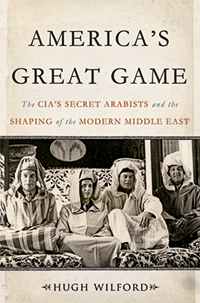The CIA’s Secret Arabists and the Shaping of the Modern Middle East
A review of America’s Great Game
Share
 America’s Great Game: the CIA’s Secret Arabists and the Shaping of the Modern Middle East
America’s Great Game: the CIA’s Secret Arabists and the Shaping of the Modern Middle East
By Hugh Wilford
The danger of a conflict between Russia and the United States is the “seen danger,” wrote a young American former intelligence officer during the opening days of the Cold War. But the “danger of Orient versus Occident seems as yet unseen; it could be ruinous; we may succumb to it from not seeing.”
The man who sensed the storm beyond the horizon was Kermit “Kim” Roosevelt, a grandson of president Theodore Roosevelt and archetypal product of East Coast American aristocracy who, along with his cousin Archie Roosevelt and a handful of other CIA men, did much to shape modern America’s relationship with the Middle East, and indeed the Middle East itself.
It is tempting to read this book as a history of what might have been. There was a time, in the aftermath of the Second World War, when America was liked and admired in the Muslim world. It had none of the imperial baggage of Britain and France, whose stars were fading anyway, and seemed keen to help modern and independent Muslim states stand on their own. This affection was returned by several of America’s adventure-loving spies, the CIA’s “secret Arabists,” to the point that the agency funded domestic anti-Zionist groups in an effort to shift American public opinion away from Israel.
But fear of the Soviet “seen danger” soon took over and poisoned the friendship. The CIA’s Arabists might have come to the Middle East wanting to help its people free themselves of colonial domination, but when faced with perceived Soviet infiltration in the region, America opted to back regional conservative leaders and the old imperial order. It was Kim Roosevelt himself who, in 1953, helped engineer the overthrow of Iranian prime minister Mohammad Mossadegh and the restoration of the shah’s rule. Other attempts to change Middle Eastern regimes using subterfuge and dirty tricks followed.
Ironically, by conflating local nationalist movements with Communism, America succeeded mostly in driving the Muslim countries of the Middle East closer to Russia. “The genius of you Americans,” Gamal Abdel Nasser, the Egyptian nationalist president and sharp stone in America’s boot, teased his CIA friend Miles Copeland, “is that you never made clear-cut stupid moves, only complicated stupid moves.”
Visit the Maclean’s Bookmarked blog for news and reviews on all things literary.